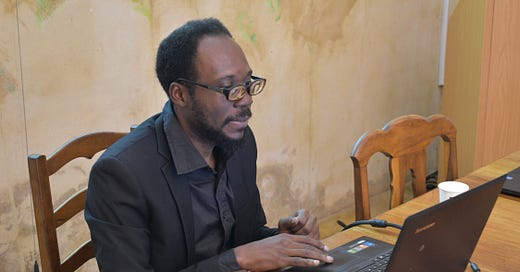Ada Agada - Consolation Theory And African Philosophy
A truly African philosophy, and how it differs from Western and Eastern philosophies.
Ada Agada is a Nigerian philosopher who has made significant contributions to the field of African philosophy. One of his key areas of focus is the concept of consolation, which he has developed into a comprehensive theory. Here, I will discuss Ada Agada's philosophy of consolation and its relationship to African philosophy, as well as how it differs from Western and Eastern philosophies.
African philosophy
Agada's theory of consolation is grounded in his understanding of African philosophy, which emphasizes the interconnectedness of human beings and the importance of community. According to Agada, the process of consolation involves creating a community of care, in which people come together to support one another through difficult times. This community can take many forms, including family, friends, religious communities, or support groups. Agada emphasizes that the key is to create a space in which people feel safe and supported, and in which they can express their emotions without fear of judgment or rejection. This approach to consolation reflects the values of African philosophy, which emphasizes the importance of communal relationships and the interconnectedness of human beings.
Western philosophy
Agada's theory of consolation differs from Western philosophy in several ways. Western thought is primarily concerned with causality and epistemology, and the focus is often on the individual and their ability to reason and think logically. Consolation is often seen as a matter of providing rational arguments or philosophical insights to help the person who is grieving. In contrast, Agada's theory emphasizes the importance of emotional support and empathy, which are often overlooked in Western approaches to consolation.
Eastern philosophy
Agada's theory of consolation also differs from Eastern philosophy, particularly Buddhist philosophy, which emphasizes the importance of detachment and non-attachment. In Buddhist philosophy, the goal is often to detach oneself from emotions and attachments in order to achieve enlightenment. In contrast, Agada's theory emphasizes the importance of emotional connection and the value of grief and loss as a necessary part of the human experience.
Healing from loss or grief
Agada's theory of consolation focuses on the role of emotions in the process of healing from loss or grief. According to Agada, consolation is not simply a matter of providing comfort or soothing words, but rather, it involves a deep understanding of the emotional state of the person who is experiencing loss. Agada argues that the process of consolation involves two essential elements: the recognition of the emotional state of the person who is grieving and the provision of emotional support.
The recognition of the emotional state
In order to understand the emotional state of the person who is grieving, Agada suggests that we need to recognize that grief is a complex emotional experience that involves a range of feelings, including sadness, anger, guilt, and regret. Each of these emotions is tied to different aspects of the loss, and therefore, each requires a unique form of support. For example, if someone is experiencing guilt over a loss, they may need to be reassured that they did everything they could to prevent the loss, whereas if someone is experiencing anger, they may need to express their feelings and be validated in their emotions.
Provision of emotional support
The provision of emotional support involves creating a safe and supportive environment for the person who is grieving. This may involve offering practical assistance, such as help with daily tasks, but more importantly, it involves being present and attentive to the person's emotional needs. Agada emphasizes the importance of listening to the person who is grieving, allowing them to express their emotions without judgment or interruption. This can be difficult, as it may require us to sit with uncomfortable emotions and to resist the urge to offer quick fixes or platitudes. However, Agada argues that this is essential for true consolation to occur.
Empathy
One of the key ideas in Agada's theory of consolation is the importance of empathy. Agada argues that empathy is necessary for us to understand the emotional experience of the person who is grieving. He suggests that empathy involves not only recognizing the emotions of the other person, but also feeling them ourselves. This can be challenging, as it may require us to confront our own emotions and vulnerabilities. However, Agada argues that this is necessary for true consolation to occur, as it allows us to connect with the other person on a deeper level and to provide them with the emotional support they need. This approach is consistent with African philosophy, which emphasizes the importance of empathy and compassion in human relationships.
Community of care
Another important aspect of Agada's theory of consolation is the idea that consolation is a communal practice. Agada suggests that we cannot console ourselves, and that true consolation requires the support of others. He argues that consolation involves creating a community of care, in which people come together to support one another through difficult times. This community can take many forms, including family, friends, religious communities, or support groups. Agada emphasizes that the key is to create a space in which people feel safe and supported, and in which they can express their emotions without fear of judgment or rejection.
Ada Agada's theory of consolation offers a unique perspective on the process of healing from loss or grief. Agada's theory emphasizes the importance of understanding the emotional experience of the person who is grieving, providing emotional support, empathy, and creating a community of care, which reflect the values of African philosophy. Agada's approach to consolation differs from Western and Eastern philosophies in its emphasis on emotional connection and the importance of grief and loss as a necessary part of the human experience. By recognizing the complexity of grief and the importance of emotional support, Agada's theory offers a compassionate and thoughtful approach to the process of consolation.




